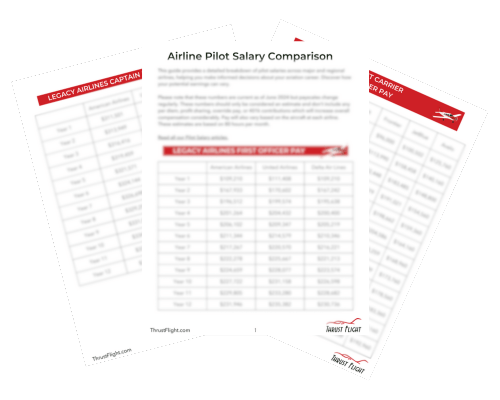Americans rethink career success as non-degree paths gain altitude.
Americans are rethinking what success looks like, and many are leaving prestige behind in favor of payoff. In a time when college tuition is soaring and student debt looms large, practicality is overtaking traditional status as the primary driver of career choice.
Success is no longer measured by titles or the number of letters after a name. It’s measured in freedom, security and how quickly a career delivers on its promises.
For many, that means favoring occupations that skip the drawn-out years of schooling in favor of earlier financial returns.
In fact, according to a new survey from Thrust Flight, more than half of Americans (52%) say they’d choose a low-prestige job with exceptional pay over a high-prestige job with modest earnings.
And while medicine has long topped the list of so-called dream jobs, a surprising shift is taking place: airline pilots now beat doctors in perceived career value.
“In today’s economy, people want careers that reward their time and effort quickly, without decades of debt,” said Patrick Arnzen, CEO of Thrust Flight. “We’re seeing a cultural shift where the idea of success is being redefined. People are looking for a return on investment, balance and financial security when they think about their futures. This is a broader reevaluation of what truly matters, especially as younger generations enter the workforce with different expectations than those before them.”
Purpose of this Study
To better understand how Americans evaluate modern career paths and the evolving value of a college degree, Thrust Flight partnered with Pollfish on the 2025 Thrust Flight Career Perceptions Survey.
The online survey polled 1,000 U.S. adults aged 18+ to assess perceptions around career prestige, education, income potential and return on time invested.
The goal was to uncover not only where public opinion stands today, but also to identify gaps in perception, especially around high-earning careers that don’t require a traditional college education. The findings provide insight into a growing cultural shift: Americans increasingly want careers that are flexible, stable and financially rewarding.
Key Findings
- Prestige Takes a Back Seat: 52% of Americans say they’d choose a low-prestige job with exceptional pay over a high-prestige job with modest earnings.
- Pilot Beats Doctor: 63% of Americans rated the airline pilot path as “very good” or “excellent” for return on time invested, more than those who said the same about doctors.
- Passion Comes First: Americans say passion (34%) matters most when choosing a career, while prestige (2%) barely registers.
- College Isn’t a Must: 78% believe non-college routes can be just as successful as a four year degree.
- Parents Shift Their Advice: 67% of parents would encourage their kids to skip college if the job is stable and well paid.
- Perception Gap Persists: Despite rising interest, 57% still believe non-degree careers don’t pay well.
- Career Change Ahead: One in four Americans say they’re “very likely” or “extremely likely” to change careers within the next five years, with higher pay (30%) as the top motivator.
- Cost And Awareness Are the Barriers: The biggest hurdles to pursuing a trade career are upfront costs (26%) and lack of awareness (23%), keeping many from making the switch.
Prestige Isn’t Everything – Pay, Passion and Balance Take the Lead
Gone are the days when a prestigious title automatically meant success. In today’s job market, Americans are weighing the tradeoffs of long academic commitments and delayed earnings.
More than half (52%) say they’d take a job with less prestige but higher pay, an indicator of changing priorities toward practical rewards.
Additionally, deeper survey results reveal a clear hierarchy of what Americans actually value in a career. Instead of chasing status, Americans now say passion (34%) matters most when choosing a career.
Work-life balance (26%), salary (18%), job security (14%) and flexibility (6%) trail behind, while prestige barely registers at just 2%. This underscores a move away from status as a deciding factor in career choices.
These changes are driven not only by a preference, but also by necessity.
With living costs climbing, student debt levels at record highs and wages stagnating in many white-collar fields, the payoff of traditional prestigious roles has eroded. These titles often require years of paying dues and climbing a slow promotion ladder before the rewards are in place.
As a result, more people are recalculating the value of their time and gravitating toward careers that offer financial security and personal satisfaction more quickly.
- 52% say they’d choose a low-prestige job that pays exceptionally well
- 27% say they’d choose a job with neither prestige nor high pay but total flexibility
- 21% say they’d choose a high-prestige job that pays moderately
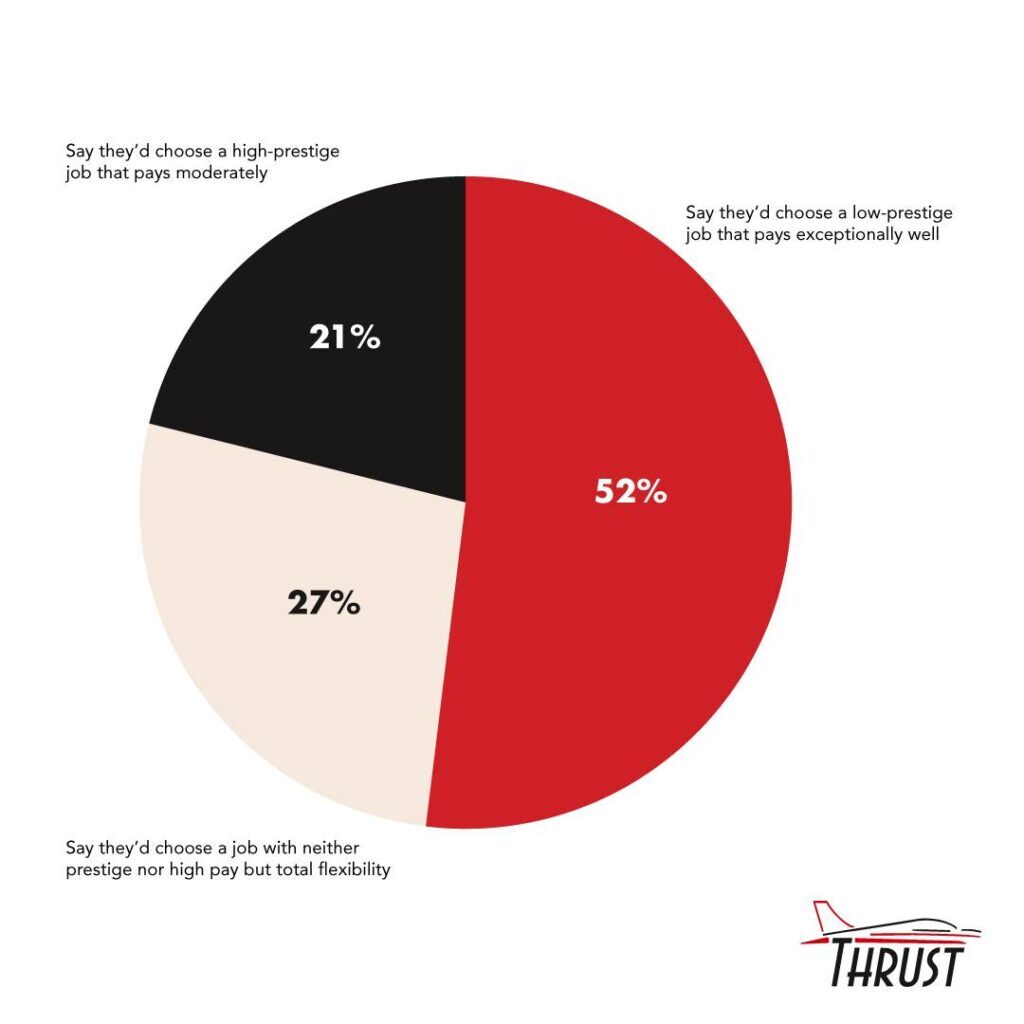
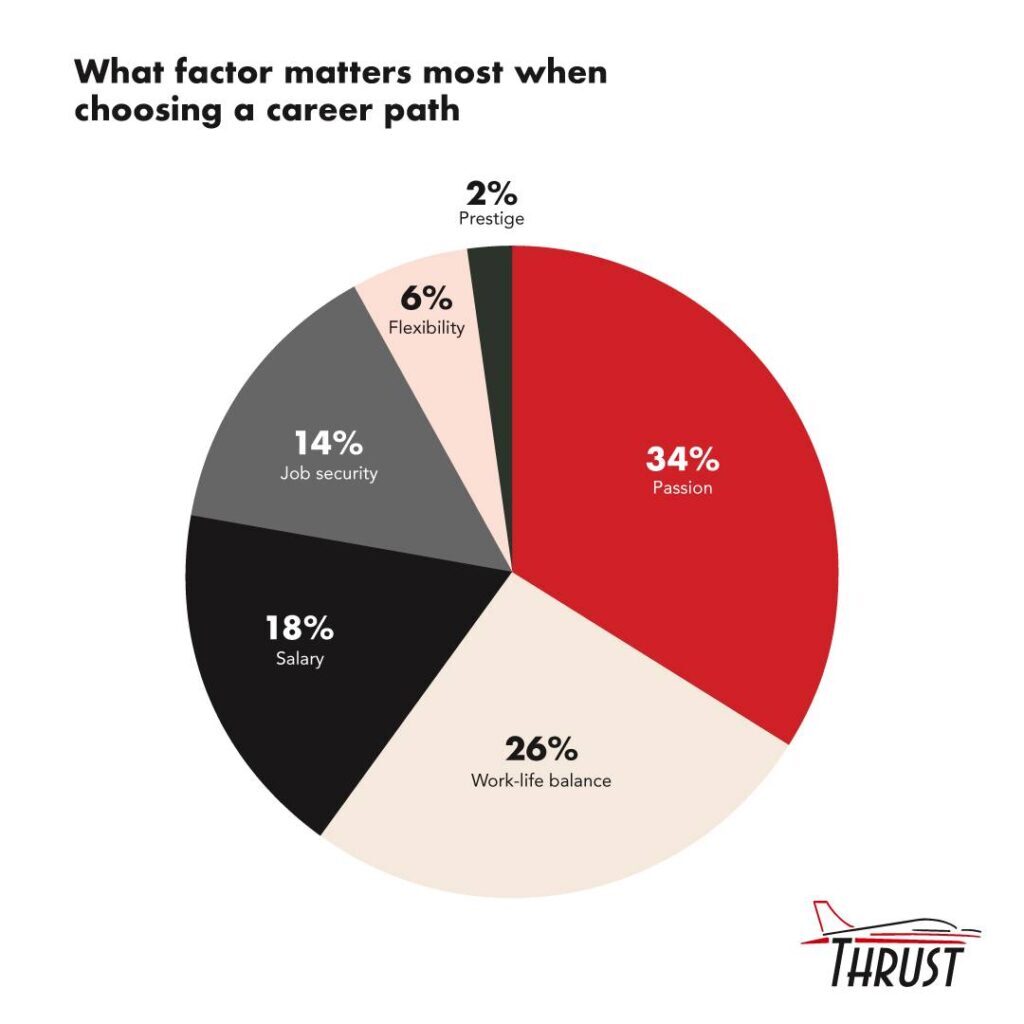
College Isn’t a Must
Another clear theme emerging from the survey is that the college diploma is no longer considered the only route to success.
A combined 78% believe non-college paths can achieve the same long-term success as a four year degree, while just 18% remain neutral and 4% disagree.
This represents a shift away from the “one size fits all” model of education.
Many now recognize that skills-based programs, vocational training and direct career tracks can deliver equal, or even better, results without the cost and time commitment of traditional higher education.
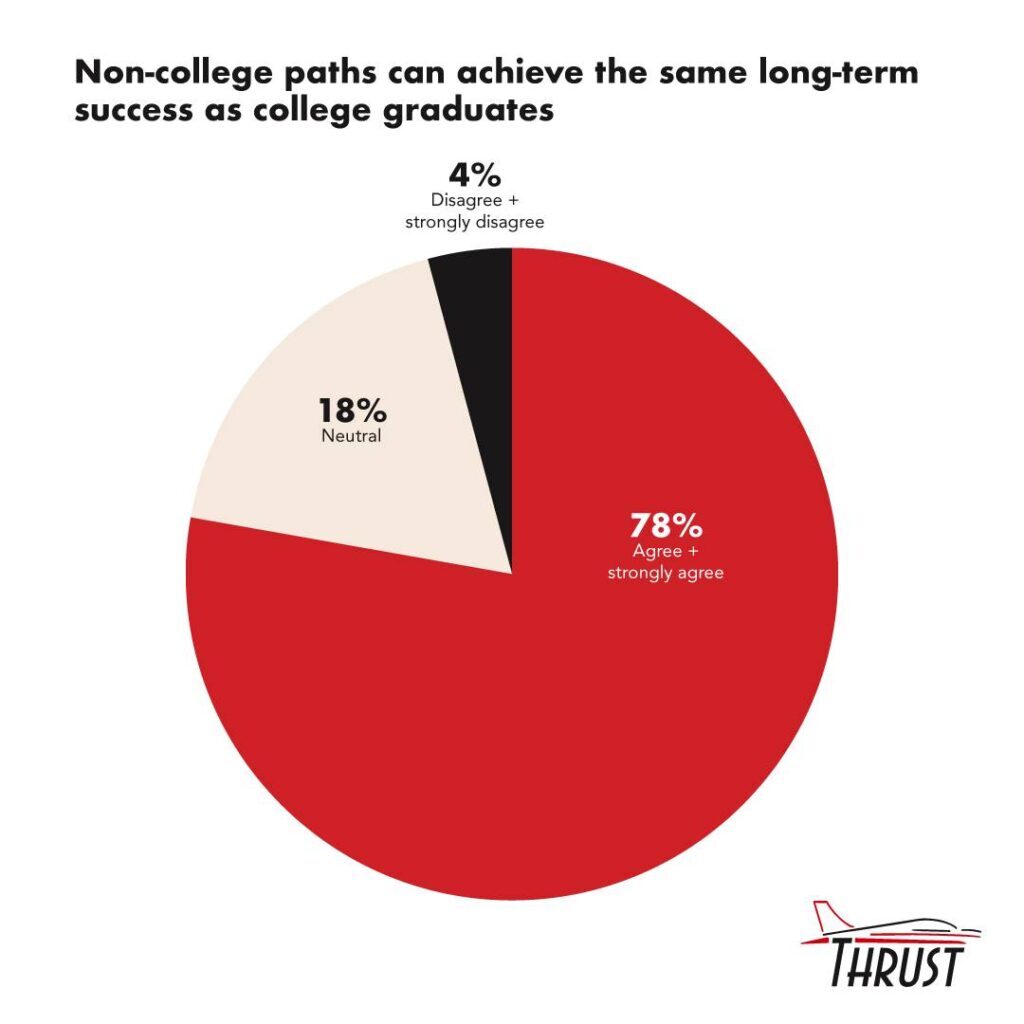
Pilot Tops Doctor, Lawyer and Software Developer for Career ROI
When asked which careers deliver the best return on time invested, Americans gave airline pilots the edge over even the most elite professions. 63% rated the pilot career path as “very good” or “excellent” in terms of payoff for the time spent in training.
This outcome made not only doctors, but also lawyers and software developers, despite their prestige, rank lower due to years of schooling, training and delayed earnings.
This finding represents a notable break from long-held assumptions. For generations, the doctor’s white coat has symbolized prosperity and security.
While physicians certainly remain respected, the reality is that the time and debt required to reach that level of success are changing how people calculate career value. Americans are increasingly aware that the path to strong earnings does not always require a decade of education.
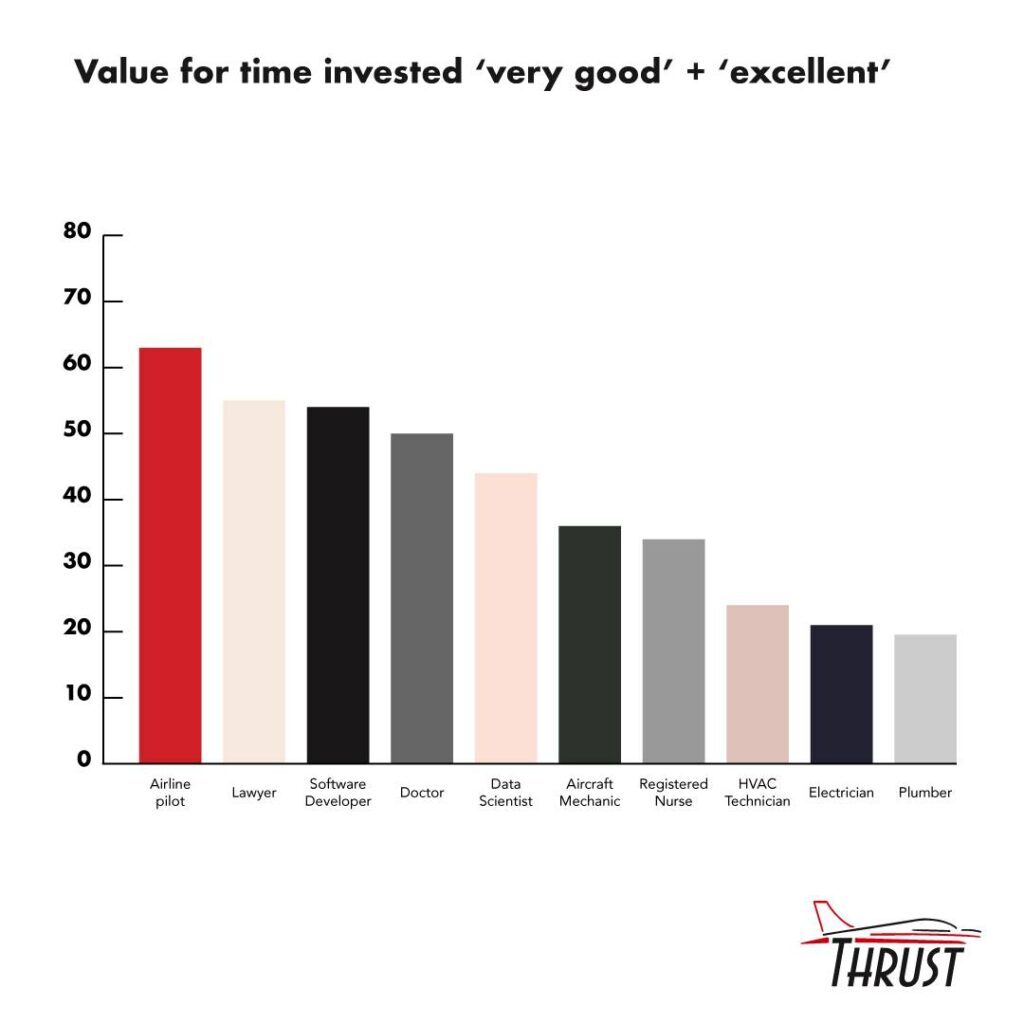
Parents Are Ready to Rethink the Degree, but the College Payoff Myth Persists
Perhaps the most telling cultural change is happening at home.
Parents, traditionally the strongest advocates for the “safe” path of a college degree, are rethinking their advice. More than two-thirds (67%) now say they would now encourage their children to skip the college degree if another career route is stable and well paid.
This marks a significant break from decades of conventional wisdom, shifting toward valuing results over rituals.
Parents are increasingly recognizing that a degree is not a universal guarantee of success nowadays and less expensive, skills-based training can be a better investment for the future.
Despite this awareness, and as interest in non-degree paths grows, a disconnect in perception remains.
More than half (57%) of Americans still believe that careers without a college degree do not pay well. That outdated belief overlooks trade fields, where individuals can achieve high salaries and career stability without a four year degree.
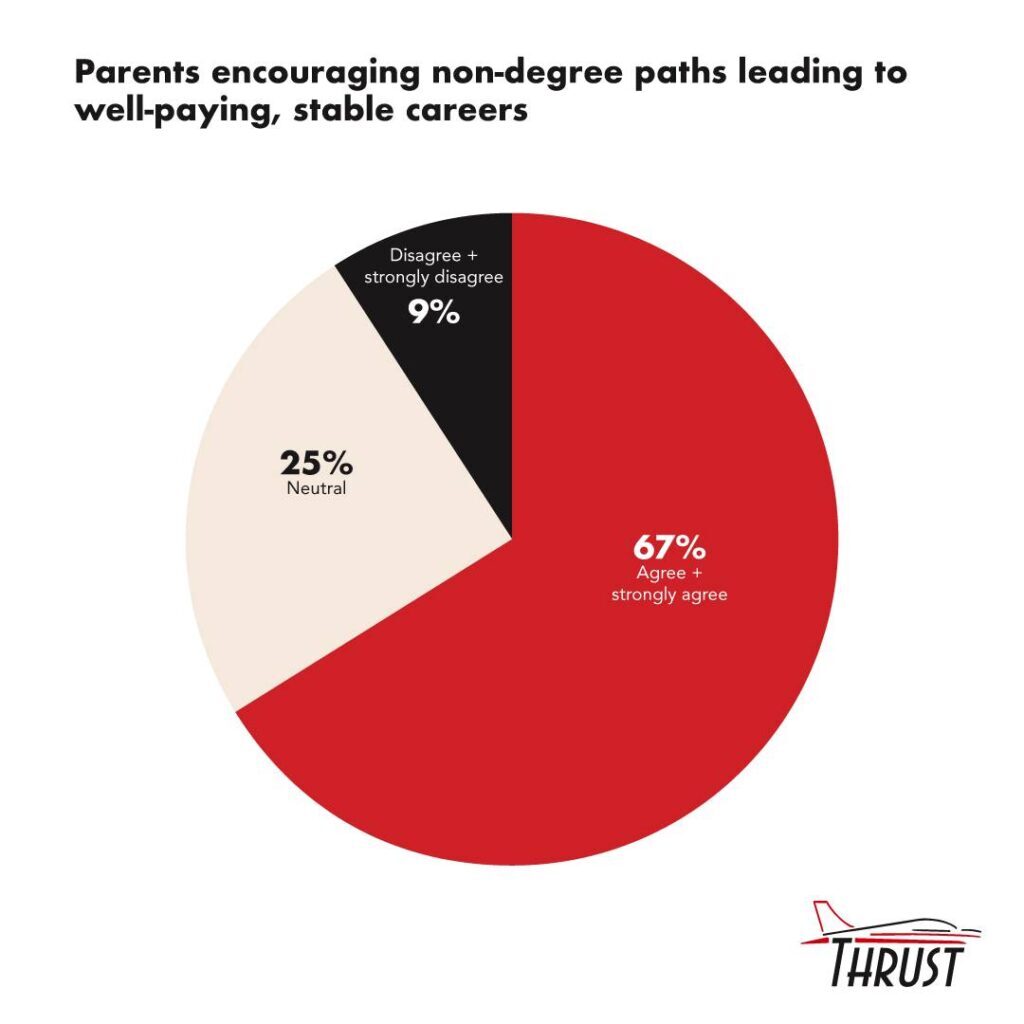
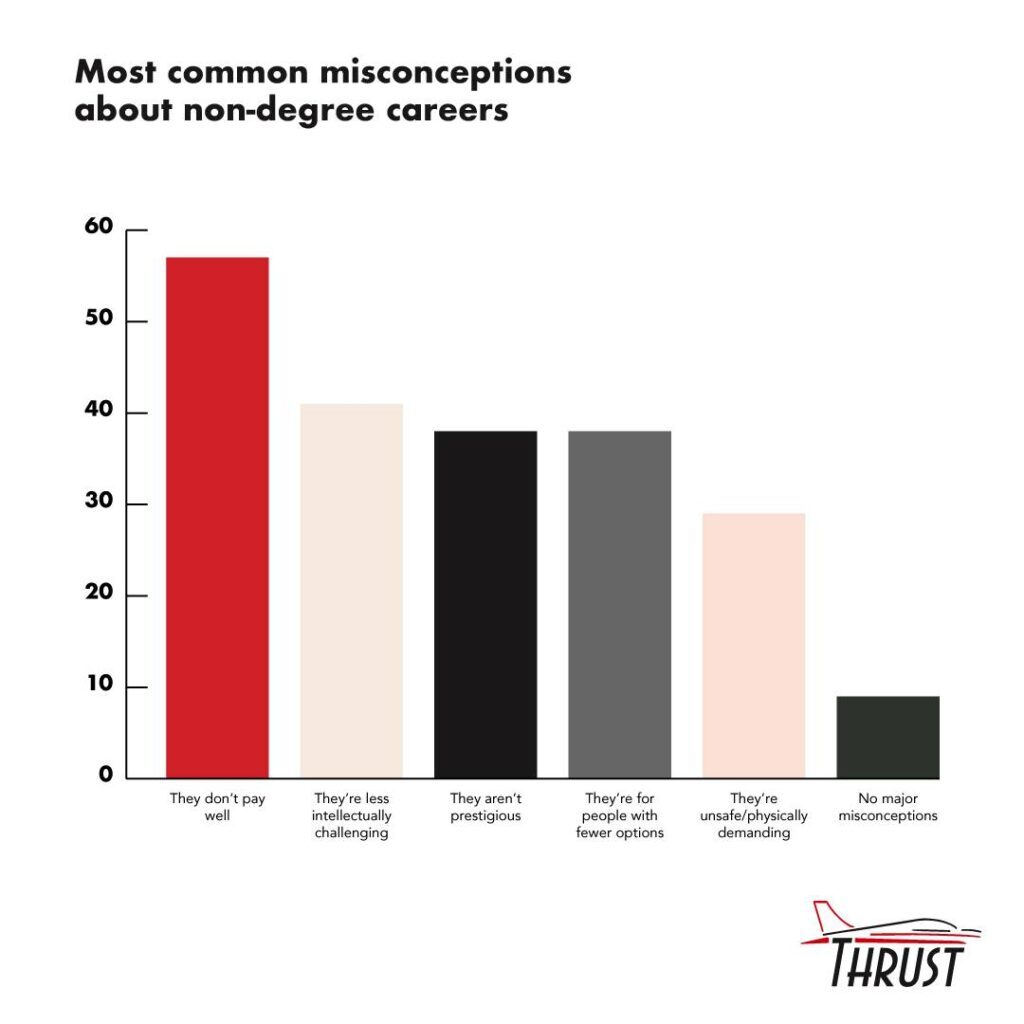
Barriers Hold Back Career Change
Americans are increasingly open to reinventing their professional lives.
One in four say they are “very likely” or “extremely likely” to change careers within the next five years, reflecting a restless workplace seeking better opportunities. The top motivator is clear: 30% say higher-than-average pay would be the reason to make the leap.
Despite this willingness to move, many face significant roadblocks.
Survey results show that the biggest barriers to pursuing trade careers are upfront costs (26%) and a lack of information or awareness (23%). These findings suggest a disconnect between aspiration and access.
While Americans are ready to embrace new career paths, financial and informational hurdles are keeping many from making the switch, slowing the transition toward industries that could meet both economic and lifestyle needs.
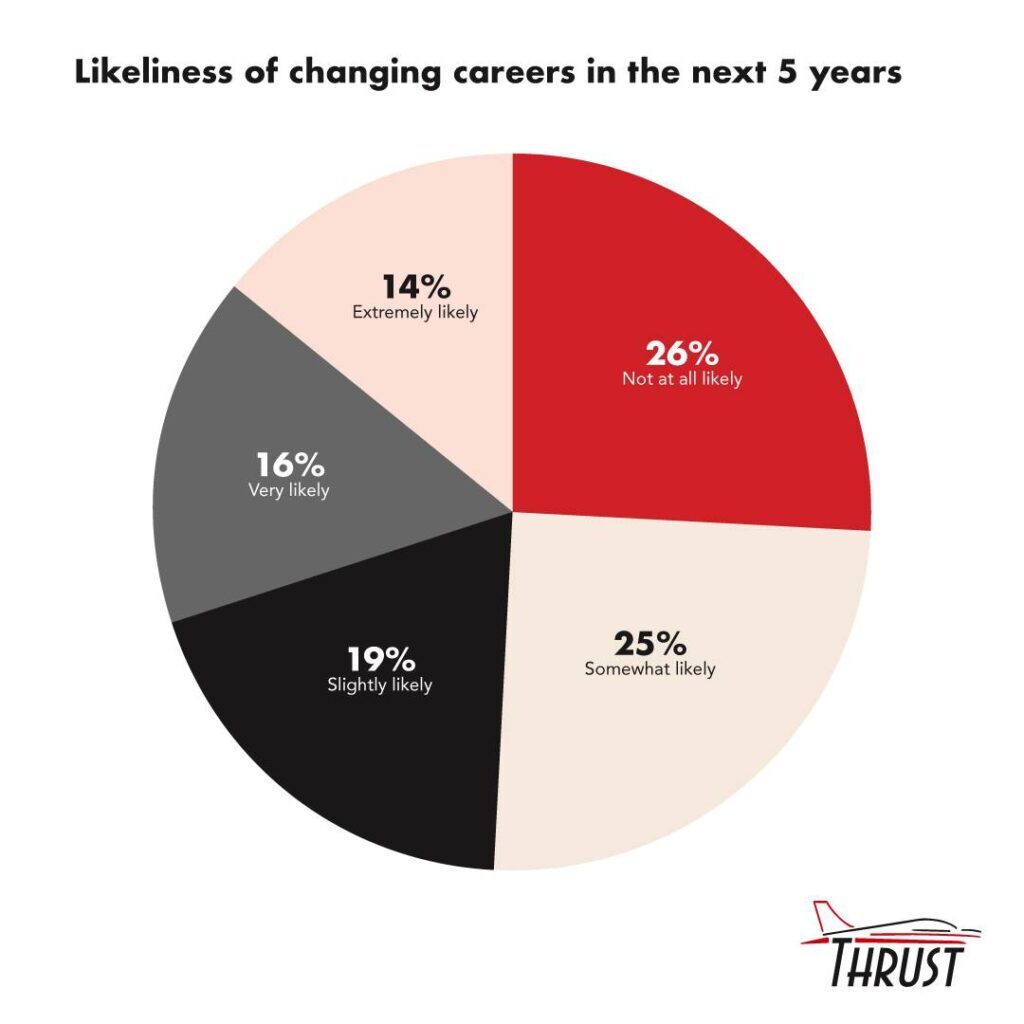
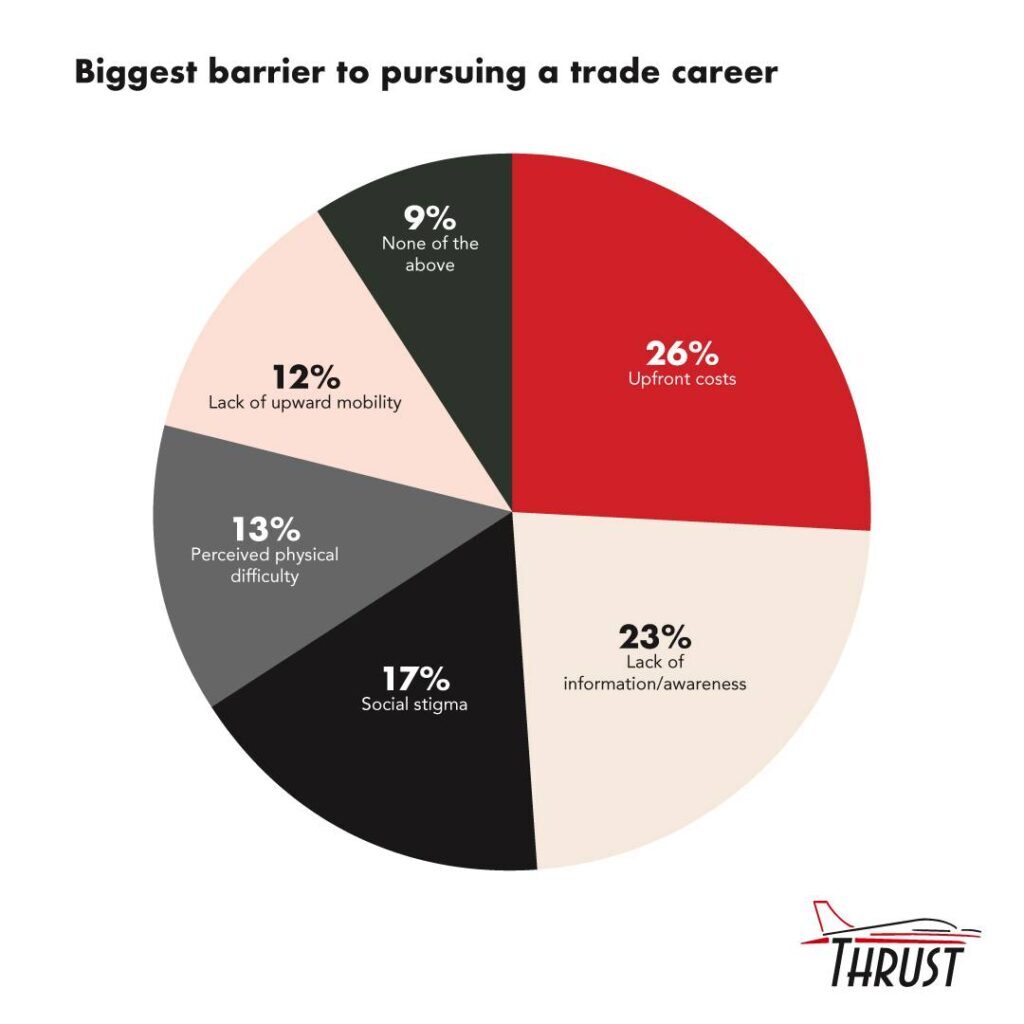
Aviation is the New American Dream
The 2025 Thrust Flight Career Perceptions Survey reveals a profound shift in how Americans define success. No longer tethered to prestige for its own sake, people are letting go of outdated ideas and embracing careers that deliver tangible results quickly without sacrificing stability or income.
In this environment, aviation stands out. It combines competitive salaries, job security and a respected professional identity, all without the long, expensive detour of a traditional degree.
Add in the adventure and travel opportunities inherent in the profession and it’s easy to see why the pilot path is flying in public perception.
Thrust Flight’s accelerated programs are designed for this moment, offering aspiring pilots a direct route to the cockpit.
In as little as 12-24 months, students can transition from the classroom to a well-paid, stable career, bypassing years of debt and delay that often accompany more traditional paths.
“Today’s workforce wants impact and income, not just a title,” said Arnzen. “For decades, the higher education equation has been sold as the only path to success, but rising debt and delayed earnings have made many question whether the math still adds up. Younger generations, especially, are asking smarter questions about return on investment. They don’t want to wait ten years to see the results. We built our programs to deliver exactly that: a faster path to a career that pays off, in every sense of the word.”
Survey Methodology
Thrust Flight used the third-party survey platform Pollfish to conduct an online survey in June 2025 of 1,000 U.S. adults aged 18+. Researchers reviewed all responses for quality control.

